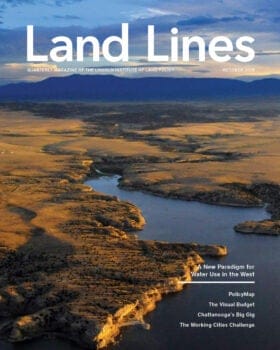
Land Lines
This issue explores how to make cities more sustainable without causing displacement, introduces a Colorado artist who draws inspiration from watershed health, and investigates how planners can use augmented reality to increase public engagement.
Subscribe-
Equitable Urban Greening
By Jon Gorey, July 22, 2025 -
Understanding Heirs Property
By Jon Gorey, July 11, 2025

February 2017
This issue features content on planning for greater social equity, the mystery of unspent federal grants, the future of conservation finance in Chile, the challenge of transplanting urban innovations, and the growing market for app-activated bike-shares in China.

October 2016
In this special edition for Habitat III we map the future—with content on the New Urban Agenda; the 2016 Atlas of Urban Expansion, sponsored by UN-Habitat, New York University, and the Lincoln Institute; the Chesapeake Conservancy’s groundbreaking high-resolution land cover GIS; and the need for a U.S. infrastructure upgrade: a WPA 2.0.

July 2016
In this issue, we feature articles on managed retreat, gentle infill, verifying green bonds, and subsidized Uber in the suburbs, as well as a policy brief on nonprofit PILOTs (payments in lieu of taxes).

April 2016
In this issue, we feature articles on alternatives to a bill that would kill the school property tax in Pennsylvania, exploratory scenario planning, post-disaster recovery planning, CoUrbanize’s online community planning forum, and more.

February 2016
In this issue, we debut our logo redesign and preview two important new books by Lincoln Institute program directors: A Good Tax: Legal and Policy Issues for the Property Tax in the United States, by Joan Youngman, and Nature and Cities: The Ecological Imperative in Urban Design and Planning, edited by Armando Carbonell along with Frederick R. Steiner and George F. Thompson.

October 2015
In this issue, we feature articles on water as a cash crop in the West, technology cures for municipal fiscal health, and the Working Cities challenge.
